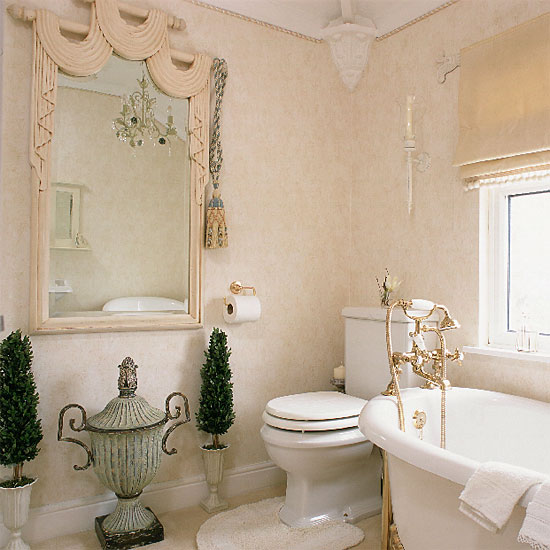Imagine yourself amidst the vibrant streets of Athens, the birthplace of democracy and an architectural wonderland. As you traverse the city’s bustling markets and ancient ruins, an inevitable need arises – the search for a restroom. But amidst the foreign signs and unfamiliar language, how do you politely inquire about this essential facility? Fret not, dear traveler, for this comprehensive guide will empower you with the linguistic tools to navigate the intricacies of Greek restrooms.

Image: www.housetohome.co.uk
The Art of Polite Inquiry
In the realm of polite conversation, it is paramount to remember that cultural nuances play a significant role. Imagine yourself standing in line at a crowded bakery, eager to satisfy your sweet cravings. As you inch closer to the counter, you notice the absence of a designated area for restroom inquiries. Do not despair! With a respectful smile and a gentle “Excuse me” (in Greek: “Συγγνώμη” pronounced as “see-gnoh-mee”), you can politely approach the cashier and make your inquiry. In most cases, they will be more than happy to assist you.
Navigating the Linguistic Landscape
Now, let us delve into the core of our linguistic quest: how to say “bathroom” in Greek. As you stroll through the lively streets of Thessaloniki, the second-largest city in Greece, you may encounter various words used to refer to restrooms. The most common and widely understood term is “τουαλέτα” (pronounced as “two-ah-lé-tah”). However, you may also encounter alternative terms such as “WC” (pronounced as “vee-see”) or “αποχωρητήριο” (pronounced as “ah-poh-ho-ree-tee-ree-oh”). The latter is a more formal term often used in official settings.
A Journey Through History
To fully appreciate the linguistic tapestry of Greek restrooms, it is essential to embark on a brief historical excursion. The word “τουαλέτα” has its roots in the French word “toilette,” which originally referred to a piece of cloth or linen used for dressing or grooming. Over time, the meaning of the word evolved to include the room where such activities took place, and eventually, it became synonymous with the restroom itself. This linguistic journey reflects the interconnectedness of languages and the ways in which words travel and adapt across cultures.

Image: mywaystosay.com
Beyond the Standard Vocabulary
As you venture deeper into the linguistic labyrinth of Greek restrooms, you will discover a plethora of colorful expressions and colloquialisms associated with this essential facility. For instance, in the informal setting of a taverna, you may hear locals referring to the restroom as “το μικρό δωμάτιο” (pronounced as “toh mee-kroh dhoh-mah-tee-oh”), literally translating to “the small room.” This affectionate term reflects the communal spirit and lighthearted approach often found in Greek culture.
Exploring Regional Variations
Greece, a land of diverse landscapes and rich cultural heritage, boasts regional variations in the language used to refer to restrooms. In the charming island of Crete, you may encounter the term “καμπινές” (pronounced as “kam-bee-nés”), which is a remnant of the Venetian occupation of the island. Similarly, on the beautiful island of Rhodes, the influence of the Italian language can be seen in the use of the word “τουαλέττες” (pronounced as “too-ah-lé-tes”). These regional variations add a touch of local flavor to the linguistic landscape of Greek restrooms.
A Restroom for All Seasons
As you continue your linguistic expedition, you will discover that the language used to refer to restrooms can also vary depending on the season. During the warm summer months, when tourists flock to the sunny shores of Greece, you may hear the term “ντουζιέρες” (pronounced as “ndhoo-zee-éh-res”) used to refer to public showers or changing rooms found on beaches. This term derives from the French word “douche,” which means shower. In the colder winter months, when the weather turns chilly, you may encounter the term “σόμπες” (pronounced as “sóm-bes”), which refers to heaters often found in public restrooms to provide warmth and comfort.
How To Say Bathroom In Greek
https://youtube.com/watch?v=8_HGdEVO5j4
A Linguistic Tapestry
In conclusion, the linguistic landscape of Greek restrooms is a rich tapestry woven with historical influences, regional variations, and cultural nuances. From the widely used term “τουαλέτα” to the affectionate “το μικρό δωμάτιο,” the language used to refer to this essential facility reflects the vibrant and diverse nature of Greek society. As you explore the captivating streets and stunning landscapes of Greece, embrace the opportunity to delve into the linguistic intricacies of restrooms. By doing so, you will not only navigate your physical needs but also gain a deeper understanding of the fascinating culture that surrounds you.